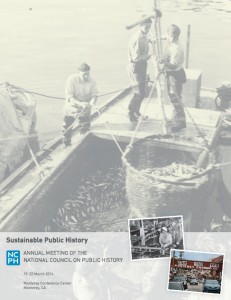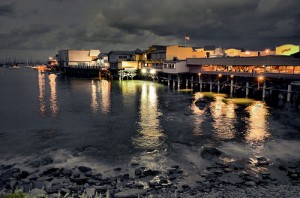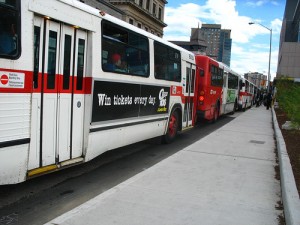Striking a balance: Conference planning and environmental responsibility
18 December 2013 – Stephanie Rowe
In her November 4, 2013, History@Work post, “My carbon offset piggybank: Thoughts on sustainability and professional conference-going,” Cathy Stanton opened a conversation about balancing the good that comes only from face-to-face meetings of peers with the harm to the environment that large national conferences can cause. As a professional conference-planner, and as an individual committed to responsible living, striking that balance is important to me. The NCPH office has been working for years to consider green practices alongside the financial health and staff capacity of the organization, as well as the registration and travel costs our attendees can afford to pay. And we try to make the meeting great, too!

Advance copies of the NCPH conference program are all-digital. (Find this year’s here.)
NCPH already prints the meeting program, as well as Public History News, on recycled paper. Starting with our joint meeting with the American Society for Environmental History in 2010, we stopped printing and mailing the Program to all members and began using a digital program for promotions and only providing a printed version onsite to registered attendees (also eliminating the need for a second, printed, onsite guide). NCPH has done away with providing conference bags filled with printed matter and, instead, asks attendees to bring their own tote bags. We also try each year, in our food and beverage arrangements with the conference hotel, to avoid packaged foods and bottled water at meal events, refreshment breaks, and in breakout rooms.
Based on preliminary feedback from the NCPH Sustainability Task Force (which will be presenting a full list of recommendations from its forthcoming white paper onsite in Monterey), NCPH is also looking into purchasing reusable, “greener” name badges (plant-based and compostable) made possible, in part, by a new sponsorship this year. Each year we do try to recycle our badge holders, asking attendees to return them when they leave the conference. Reusing these expensive materials is best for NCPH, the environment, and for attendees (the more we can reuse, the less your registration costs). For 2014, we are also pleased to unveil a central location in the Public History Commons for posting ride and room-share requests, and in Part 2 of her blog post mentioned above, Cathy provided some resources for attendees interested in purchasing carbon offsets for their travel to the meeting. We urge you to join your colleagues, and the NCPH staff, who have already made their personal pledges to offset their travel.

The opening reception venue overlooks Fisherman’s Wharf and Monterey Bay. Photo credit: DanK.
This year we have the distinct pleasure of hosting our meeting in the beautiful city of Monterey, California, and our amazing Local Arrangements Committee secured a unique opening reception venue overlooking Monterey Bay and Fisherman’s Wharf: the Museum of Monterey. Hosting this reception offsite allows NCPH to support a local museum, and we’re sure the location will result in a memorable evening for our attendees.
However, moving the event out of the conference center meant a difficult decision about catering services. The Museum of Monterey does not have its own major catering operation. To provide food and drinks, we must contract with an outside vendor who needs to bring all supplies into the venue from the vendor’s own facility. The transport of glass and china from offsite comes with significant additional costs for NCPH and a hidden environmental impact (i.e. transportation of materials). As a result of these factors, and after much discussion, NCPH made the decision to use disposable, compostable “plastic” ware, made in the US from plants, rather than traditional glass and china. While this might not seem like the greenest choice, it’s part of our effort to find the right balance among several factors: hosting a distinct reception, supporting a local public history institution, and offering the greenest catering we can provide without driving up ticket costs or jeopardizing the NCPH budget.
Another unique challenge for our meeting in Monterey is transportation. Because we know that hotel stays are a major expense for our attendees, we chose to keep overnight prices down by blocking rooms at three different hotels in the Monterey area, two of which are not adjacent to the Monterey Conference Center, our meeting headquarters. This means that we need to provide shuttle transportation between hotels for those who are unable to make the walk between sites, for people in a hurry between sessions and meetings, and just in case it rains. We’ve placed our order for sunshine! With your help, we can use fewer shuttles to keep costs down for our attendees and also limit the number of emissions-producing buses running throughout the meeting. So that we can use as few buses as possible, we have to ask some of you to commit to walking from your hotels to the Conference Center.

Last year’s conference in Ottawa made use of the city’s public transit system. Photo credit: Matthieu Yiptong.
We are also working to have as many buses as possible pull double-duty, providing shuttle and field-trip service. Our office and Local Arrangements Committee looked into conducting some tours using public transportation (which we had some success with in Ottawa), but we found that this year, infrequent and poorly located bus routes would cause participants to miss too much meeting time even for short tours. While some of our events will be using rather large tour buses, we still hope you’ll participate in them because many of them support local public history organizations and local businesses!
NCPH is looking forward to receiving additional recommendations from the Sustainability Task Force. In the future, we hope to improve our ability to identify and contract with hotels with sustainability policies, as well as using local food when we can. We do ask for your patience with any larger changes. Conferences the size of ours are planned years in advance, starting with city selections and hotel contracts, so there will be a delay between when we begin pursuing new policies and goals and when those changes become visible in future meetings. The changes that have already been made and those we are now considering for the future are the result of conversations and plans made over the past five years. These are just now coming to the fore for 2014 as our Task Force has gained speed and our theme of Sustainable Public History encourages us to push for visible improvements quickly. NCPH is committed to finding economically sound ways to balance the needs of our constituents with our responsibility to limit our environmental impact.
~ Stephanie Rowe is Program Manager for the National Council on Public History.



